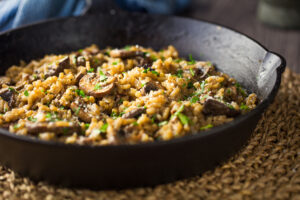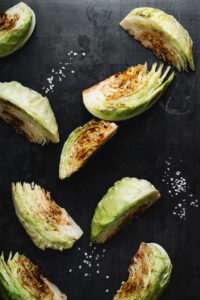
It is common for cancer patients and survivors to ask me what they should eat to keep cancer from growing or coming back. My first response is that there’s not one food or nutrient that can prevent or cure cancer. In fact, we don’t consider nutrition a treatment for cancer at all.
Rather, the role nutrition plays is to help support the body to stay as healthy as possible while cancer therapies target the tumor. A cancer patient’s nutrition strategy will depend on the side effects from treatment. If they aren’t having any side effects, then we recommend a healthy diet and being physically active to maintain muscle mass.
For cancer survivors who have completed treatment, it’s the same advice! We want them to eat a healthy diet and focus on building muscle through physical activity. But a “healthy diet” is such a vague recommendation!! Most survivors that I work with want to know – WHAT DOES THAT MEAN EXACTLY?
What Foods Should I Eat??
There are many beneficial foods. However the most effective nutrition ‘cancer control’ strategy involves the concept of synergy. Synergy means that the combination of nutrients that the body gets from eating several different types of foods is more effective than eating a lot of one type of food.
For example, you would get more benefit from eating a meal containing kale, sweet potato, brown rice, black beans and strawberries than you would from drinking a large glass of pomegranate juice or taking a supplement pill.
And remember:
Your body would rather get nutrients from FOOD! You can take supplements if you want, but they will never make up for a deficient diet! What I often point out to my classes is that the trouble with many people’s eating habits doesn’t have much to do with the junk they are eating.
The most important part of healthy eating is the idea of a nutrient dense diet. This means that the foods that you eat are high in the health promoting nutrients, vitamins, minerals, fiber and phytochemicals. I like to call these foods “protectors”. They put the odds in your favor to reduce your risk of health problems.
Nutrient dense foods include fruits, vegetables, minimally processed whole grains, nuts and legumes (dried beans). By getting a variety from each of these groups you will get a good array of nutrients to help fight cancer.
If you’re not familiar with phytochemicals, they are plant compounds (phyto means plant) that are thought to promote healthy tissue in the body and support the immune system.
There are more than 1,000 phytochemicals discovered so far and more will continue to be discovered. Some of the more common phytochemicals are:
- beta-carotene
- lycopene
- isoflavones
- leutein
The color of the plant foods you eat can give you an indication of the type of phytochemicals that it has, and that is why we are often encouraging people to “eat the rainbow!”
Basically, the more phytochemicals you get in your day, the better! Every time you eat or drink something, you can choose to include phytochemicals. Think of it as “choose your own adventure!”
I do feel the need to point out that when I talk about eating a nutritious diet, it does not mean you have to eat a PERFECT diet. If you’re eating lots of phytochemicals on most days (5-6 days a week), then your body can handle those 1-2 days a week that don’t quite add up.
However, if your habit is the opposite of that and you only get enough fruits and veggies on 1-2 days a week, it will be hard for your body to make up the other 5-6 days without it!
3 Tips for Including More Phytochemicals in Your Day
- Every meal should have a fruit, vegetable or both. Most people don’t like veggies at breakfast, so be SURE to get fruit, preferably 1 cup of fresh fruit, at breakfast time. If you don’t have fresh fruit around, a good back up plan would be dried, canned (in ‘lite’ juice) fruit, or 100% fruit juice. Lunch and dinner should have at least 1 cup of vegetables. If you don’t have vegetables at lunch, you probably won’t meet your daily intake of fruits and vegetables.
- Make sure that 1/2 of your plate is covered in fruits and/or vegetables, 1/4 of your plate with whole grains and 1/4 with protein (bonus points if your protein comes from a plant, like legumes, tofu, nuts or seeds).
- Have fruit for dessert.
Take A Diet Audit!
For a lot of people, simply keeping track of the amount of fruits and vegetables they eat each day can be an eye opening activity and provides them with insight on where they need to be fitting in more fruits and vegetables. Ideally, a healthy diet would have between 4-5 cups of fruits + vegetables daily.
Eat more plants!
By Julie Lanford MPH, RD, CSO, LDN
The Cancer Dietitain





